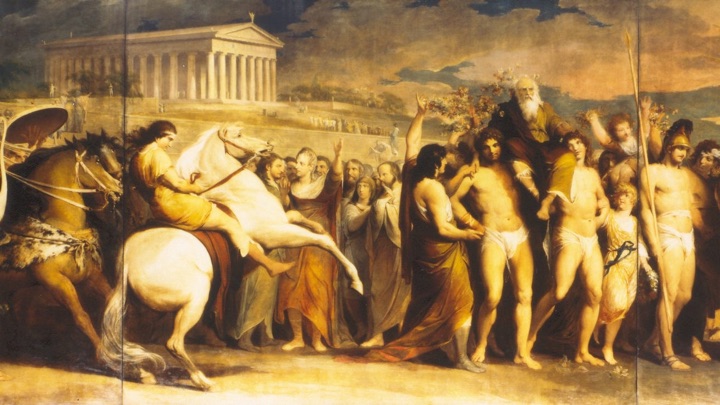
Therefore—it being August and all—rather than just repeat myself, I’ll refer interested readers to those links for lots of info about Metastasio’s spin on romantic entanglements during the ancient Olympic Games.
If Pergolesi and Cimarosa’s versions (separated by nearly 50 years) don’t suffice, YouTube handily supplies yet another: Baldassare Galuppi’s from 1748.
While several other mezzo sopranos we all can name have for years dominated the world’s stages and recording studios performing baroque music, Italian Bonitatibus has more quietly also been doing marvelous work in the same repertoire. She has released a number of solo recordings, the most impressive being her superb two-CD Semiramide anthology which I reviewed here six years ago.I’m unsure whether Bonitatibus has ever performed in the US so I was thrilled to catch her at Munich’s Bayerische Staatsoper in 2005 starring in a revival of Nigel Lowery’s production of Gluck’s Orphée et Eurydice. Some may be familiar with the DVD starring Vesselina Kasarova, but Bonitatibus proved an equally committed Orphée, noble and splendidly sung (including the spectacular Viardot cadenza at the conclusion of “Amour viens rendre à mon âme”), without any of Kasarova’s grotesque mannerisms.
Bonitatibus’s Pergolesi Licida and Cimarosa Megacle (both trouser roles) dominate each of today’s casts. (Note the surprising Argene from 20 years ago of current verista Ermonela Jaho.) Of particular note are the mezzo’s spectacular duets as Megacle with the young Patrizia Ciofi.
After several decades, “the other Anna” continues to perform baroque works at the highest level. Earlier this year she repeated her acclaimed Handel Agrippina when the Hamburg Staatsoper restaged Barrie Kosky’s Munich production. Its broadcast showed her still in sovereign form.
As a non-Olympic bonus, I’m also including today Bonitatibus’s arias from another recent 18th century venture, the modern premiere of Riccardo Broschi’s La Merope from the Innsbruck Festival in which she portrayed the title role. Broschi was, by the way, the brother of the famed castrato Farinelli.
Listeners should be warned that this primitive-sounding in-house “pirate” can be noisy at times but the singer’s idiomatic élan shines through nonetheless.
Many thanks to “hubertroad” who facilitated my obtaining the Pergolesi and Cimarosa broadcasts some 15 (!) years ago.
Pergolesi: L’Olimpiade
Beaune Festival
26 July 2003
Broadcast
Aristea: Gemma Bertagnoli
Megacle: Masha Carrera
Licida: Anna Bonitatibus
Argene: Rosanna Savoia
Alcandro: Sonia Prina
Clistene: Stefano Ferrari
Aminta: Mark Milhofer
Accademia Bizantina
Conductor: Ottavio Dantone
Cimarosa: L’Olimpiade
Teatro Malibran, Venice
December 2001
Broadcast
Aristea: Patrizia Ciofi
Megacle: Anna Bonitatibus
Licida: Laura Brioli
Argene: Ermonela Jaho
Clistene: Luigi Petroni
Aminta: Bruno Lazzaretti
Orchestra Barocca di Venezia
Conductor: Andrea Marcon
Broschi: La Merope (selections)
Innsbruck Festival
August 2019
In-house recording
Merope: Anna Bonitatibus
Innsbrucker Festwochenorchester
Conductor: Alessandro de Marchi
Both versions of L’Olimpiade and the Broschi arias be downloaded by clicking on the icon of a square with an arrow pointing downward on the audio player above and the resulting mp3 files will appear in your download directory
In addition, more than 400 other podcast tracks are always available from Apple Podcasts for free, or via any RSS reader.
The archive which lists all Trove Thursday offerings in alphabetical order by composer was recently up-to-dated.



